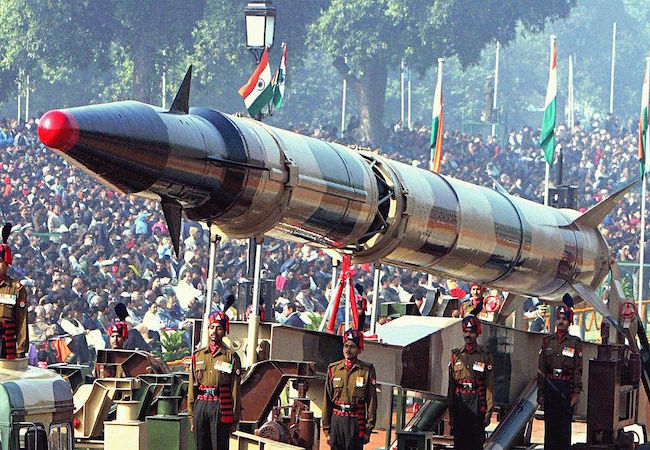
By Syed Zain Jaffery
India on Thursday successfully test fired intercontinental ballistic missile (ICBM), Agni-V which is capable of carrying nuclear warhead of 1.5 tons up to a range of over 5,000 km. According to the various assessment, it is the most advanced and longest ranged ballistic missile and can reach to most parts of China. India’s Agni-V test has triggered the alarms bells not just in Beijing but several other European capitals which are now under the range of India’s nuclear-tipped ICBMs. The dangers of updated versions of Agni-V are even worse for the entire world community.
The MIRVing of more advanced Agni series is not a distant dream for military ambitious India. Saurav Jha, the Editor-in-Chief of Delhi Defence Review states, It may also serve as a baseline for a longer range and heavier missile that will carry multiple independently targetable re-entry vehicles (MIRV) and this missile may be designated Agni-VI. Despite, the Agni-V’s current potency, a MIRVed Agni-VI will be needed to guarantee penetration against China’s ABM system in the decades ahead.
This development is not just troublesome for China alone but also pose a great security threat for the US and Europe from a non-NPT India which also refuses to sign comprehensive nuclear test ban treaty (CTBT). Undoubtedly, various European states would feel threatened by the rising range and variety of New Delhi’s missile capability and particularly the recent test of Agni V needs to be seen as wake-up call.
Agni-V with strike range of over 5000km can easily target entire Europe and American mainland. It’s ironic that, on one hand India is seeking assistance from European states in its quest for the membership of elite nuclear club such as Nuclear Suppliers Group (NSG), on the other, its nuclear tipped missiles have the capabilities to hit those very states.
As per federation of American scientists (FAS) estimates, India is estimated to have around 120 to 130 nuclear warheads in its arsenal and with each passing day its nuclear arsenal is on rise, making it world’s fastest developing nuclear weapon state. Over the years, the US and other western powers have put a blind eye on Indian nuclear developments as these countries see latter’s nuclear capabilities necessary to counter Chinese rise.
Since BJP came in power, India has been following hegemonic and coercive policies with specific focus on military-buildup in Indian Ocean. India has demonstrated its intent to meet various challenges through coercion and military means. For instance, India has been world’s top weapons importer and its defense budget has reached to US$ 53.5 billion, a strange pattern for a state with enormous population living under poverty line. With massive focus on defense, India’s pursuit of hegemonic policies is not just creating instability at regional level but also adds to the global instability. The spill-over effect of instability from regional to global is real and India’s hegemonic intention is the sole impetus.
The fragile south Asian security environment has been further degraded by India’s unprecedented nuclear developments. Regional countries, such as Pakistan, has been compelled to become part of an unnecessary nuclear arms race which is becoming counterproductive for not just India but also for other regional powers. A nuclear India is not just a threat for South Asia’s smaller powers but it has become global danger due to its ICBMs.
It’s high time for International community to realize the severity of the threat emanating from India’s nuclear program which has now global intentions. For that a missile restraint regime has become inevitable for South Asia. It’s now mutual responsibility of international community to restrict India’s ambitions of becoming global power on the basis of its nuclear arsenal and military might. Global community must encourage economic inclusiveness rather than military might as a mean for global status. For that, India needs to revisit its military oriented approach and focus more on economic globalization to become respectable member of global community.
Syed Zain Jaffery is a Current Affairs and Political Science Student, holds Masters Degree from NUST, Islamabad.




